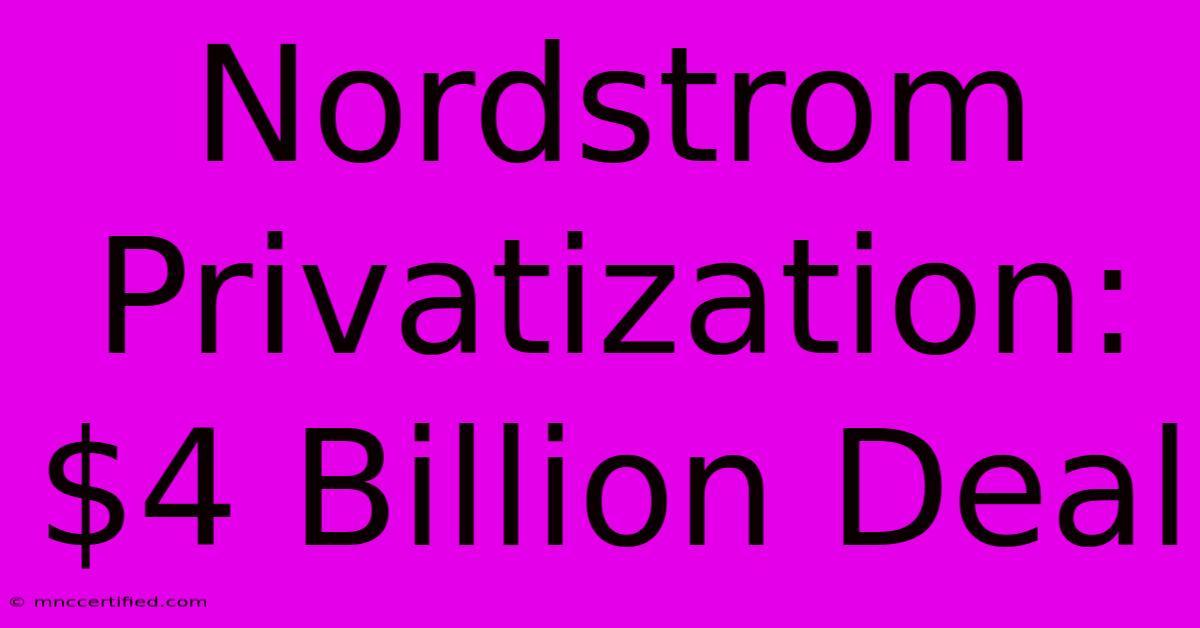Nordstrom Privatization: $4 Billion Deal

Table of Contents
Nordstrom Privatization: A $4 Billion Deal Reshapes Retail
The retail landscape is constantly shifting, and a major earthquake recently struck with the privatization of Nordstrom, Inc. In a deal valued at approximately $4 billion, the iconic department store chain went private, marking a significant moment for both the company and the broader retail industry. This article delves into the details of this monumental transaction, exploring its implications and examining the future of Nordstrom under private ownership.
Understanding the Nordstrom Privatization
Nordstrom's privatization wasn't a sudden decision; it followed years of navigating challenges inherent in the evolving retail environment. Increased competition from online retailers, shifting consumer preferences, and economic headwinds all played a role. The $8.8 billion buyout offer, led by the Nordstrom family, ultimately proved irresistible. This move effectively removes the pressure of quarterly earnings reports and allows for long-term strategic planning free from the scrutiny of public markets.
Key Players and the Deal's Structure
The privatization deal is primarily driven by the Nordstrom family, who own a significant stake in the company. This family-led buyout represents a return to private ownership, reflecting a belief in the company's long-term potential despite recent difficulties. The deal's structure involves a combination of cash and debt financing, showcasing the significant financial commitment required to execute such a large-scale transaction. The exact details of the financing remain complex but highlight the family's confidence in the company's future prospects.
Implications of Nordstrom Going Private
The shift to private ownership carries profound implications for Nordstrom, its employees, customers, and the retail sector as a whole:
Potential Benefits of Privatization
- Increased Flexibility: Freed from the quarterly earnings pressure of public companies, Nordstrom can implement long-term strategic initiatives without immediate market reaction concerns. This includes investments in technology, supply chain optimization, and potentially, store renovations or expansions.
- Focus on Long-Term Growth: Private ownership allows for a more patient approach to growth, prioritizing sustainable strategies over short-term gains. This could involve a renewed focus on customer experience and brand building.
- Reduced Public Scrutiny: Operating privately minimizes the intense public scrutiny that comes with being a publicly traded company. This offers more freedom in decision-making and allows for quicker responses to market changes.
Potential Challenges and Risks
- Access to Capital: While private ownership offers flexibility, accessing capital for future investments might be more challenging than when the company was publicly traded.
- Lack of Transparency: Private companies are typically less transparent than public companies, which could concern customers and investors interested in monitoring Nordstrom's performance.
- Potential for Increased Debt: The significant debt assumed to finance the buyout could burden the company and limit its financial maneuverability in the future.
The Future of Nordstrom: Predictions and Analysis
The success of the privatization will hinge on Nordstrom's ability to execute its strategic vision. While the family's commitment is clear, the retail landscape remains competitive. Key areas to watch include:
- E-commerce Strategy: Continued investment in e-commerce capabilities is crucial to compete with online giants. Enhancing the online shopping experience and optimizing logistics will be key.
- Customer Experience: Delivering exceptional customer service both online and in-store will be paramount to retaining and attracting customers in a crowded market.
- Brand Differentiation: Standing out from competitors requires a unique brand identity and offering. Nordstrom needs to solidify its position as a destination for high-quality goods and exceptional customer service.
Conclusion: The Nordstrom privatization is a significant development in the retail industry. While the long-term effects remain to be seen, the deal offers both opportunities and challenges. The success of this strategy will depend on the company's ability to adapt to evolving consumer preferences, enhance its e-commerce capabilities, and maintain a strong brand identity. Only time will tell if this bold move will ultimately revitalize the Nordstrom brand and secure its future.

Thank you for visiting our website wich cover about Nordstrom Privatization: $4 Billion Deal. We hope the information provided has been useful to you. Feel free to contact us if you have any questions or need further assistance. See you next time and dont miss to bookmark.
Featured Posts
-
Red Light Green Light Know The Game
Dec 24, 2024
-
2024 Game Recap Packers 34 Saints 0
Dec 24, 2024
-
Panama Canal Ownership Trumps Interest
Dec 24, 2024
-
Honda Nissan Merger Canton Leaders Respond
Dec 24, 2024
-
Panthers Raiders Impact 2025 Nfl Draft
Dec 24, 2024